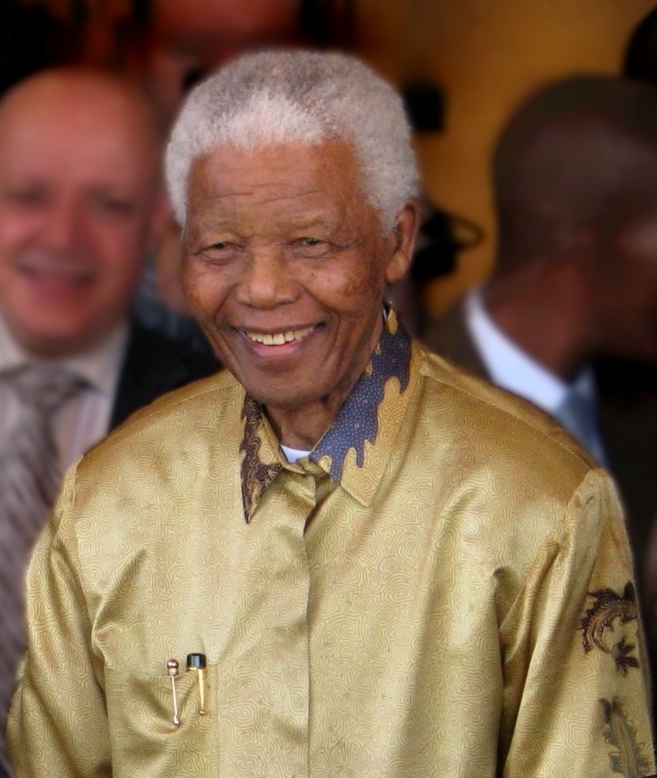Madiba, the Father of the Nation, has gone and sad though it is, no one would have wished this great, great man to malinger, not his family, not his countrymen, no, not even his enemies of apartheid times.

Mandela in Johannesburg. Wikimedia Commons: South Africa The Good News
He outlived so many who wanted him dead: the police ministers who locked him away, prime ministers too, and those he returned to haunt with his magnanimity and forgiveness, many in fact became his friends, or at least came to admire his strength of character.
I was a diplomat in South Africa from 1979 to 1983 and to everyone there, the name Mandela was the symbol of resistance and hope, the gone but not forgotten man who led the anti-apartheid struggle from a tiny gaol cell on Robben Island in Table Bay, one of the most beautiful views in the world, where a veritable ‘table-cloth’ was drawn on their existence.
Most days he and his fellow inmates worked for years at the quarry, breaking rocks but the inmates themselves could not be broken.
Years after Mandela was released, I was with a parliamentary delegation that travelled to Robben Island with Govan Mbeki, then Deputy President of the Senate and the father of President Thabo Mbeki.
Govan Mbeki served 24 years on Robben Island, second only in tenure to Nelson Mandela, and when the boat carrying us to the island cut its engines, he started to tremble.
It was the first time since his release in 1987 that he had ‘been back’ and afterwards he told us, “that silence conveyed the end of life, and many of us feared we would never leave the island alive.”
Mandela, he told us, “kept us sane, kept us believing and kept us focused. Issues were reasoned out and if we hadn’t been in a prison, it could almost have been a university atmosphere.”
As a representative, I met with many people who led the anti-apartheid struggle: Bishop Tuto, Dr Motlana, Allan Boesak, Janet Suzman, Alistair Sparkes; and travelled to dusty, desolate Brandfort where Winnie Mandela had been “banned” – exiled.
I spoke to her over the fence of her tiny little house under the watchful eye of security personnel to ensure she didn’t contravene her ‘banning order,’ to only speak to two people at a time.
The question to them all was, “How is Mandela,” for like many, we longed for news of him, and it always came, smuggled out - messages of hope, never despondency.
Many people, leaders, activists, some diplomats, humanitarians, and lots of ordinary citizens, including those brave, brave white women of the Black Sash movement, who simply stood in public places with a simple black sash across their dresses to prick the white consciousness and copped torrents of abuse and filth, all worked to free Mandela and his fellow inmates and rid the country of apartheid.
My small bit was in sport where I played cricket for the “whities” in Pretoria and for the “blacks and coloureds” in Capetown.
Under my diplomatic immunity (and with my Ambassador’s blessing), I refused to get permits to enter “black townships” to play, and brought black team-mates back to my home for an after match braai and a swim, a practice I soon stopped when the cops waited outside my gates and arrested them for transgressing the “pass laws,” forbidding them to be in “white only areas” after a certain time.
Just being with a black friend was instructive in how much apartheid laws affected blacks in everything they did.
Through the Foreign Ministry, I counselled the Government to resist efforts to ‘re-engage South Africa in cricket and rugby,’ on the basis of a few ‘token blacks’ playing those sports at the highest level.
There could be “no normal sport with an abnormal society,” simply because the playing field could never be level for Blacks to achieve equal opportunity due to inferior education, living conditions, and the sheer psychological effects of ‘white superiority.’
I only ‘did an Edward Snowden’ once and ‘leaked’ to the media when the Government became increasingly in favour of resuming tours by mixed teams.
In the resulting press and public outcry, the proposal was abandoned.
Things have come a long way since those awful days and watching South African teams is a great joy – yes, even when they are defeating ‘my mob,’ for while there is still a long way to go, the fervor with which national teams embrace the Rainbow Nation was one that gave Mandela and his supporters around the world much joy.
His smile, his voice, his genuine warmth for everyone who met him will never diminish.
At our Parliament House, he flustered Protocol, and kept the PM waiting, while he stopped and talked to a ‘simple doorman’ – a flushed and chuffed fellow who will be telling his kids that story today.
Rest in Peace Madiba – you have earned it.
Winfred Peppinck is the Tales of the Traveling Editor for Wandering Educators
